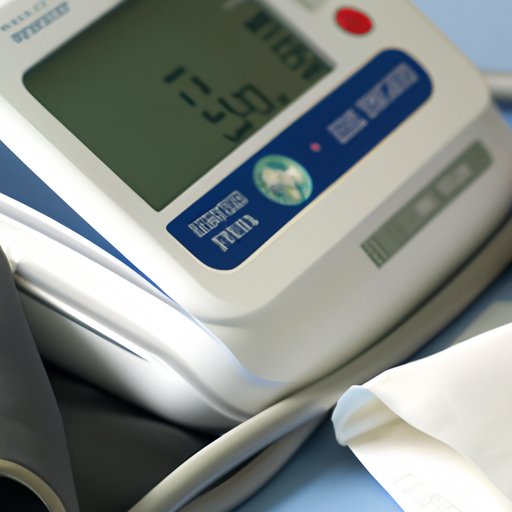
I. Introduction: The Impact of Stress on Blood Pressure
Stress is a common experience in our lives, with both short-term and long-term effects on our physical and mental health. One of those effects that can have serious consequences is an increase in blood pressure. In this article, we’ll explore the science behind how stress affects blood pressure and offer practical strategies for managing stress and maintaining a healthy blood pressure.
II. The Science of Stress and Blood Pressure: An Overview
Stress is a complex response that involves various physiological and psychological processes. When we experience stress, our bodies release hormones such as adrenaline and cortisol that prepare us to respond to a threat or challenge. One of the responses that this activation triggers is an increase in heart rate and blood pressure.
The reason for this is because when we experience stress, our blood vessels constrict, reducing blood flow to other parts of the body and increasing the pressure within them. This is often referred to as the “fight or flight” response, which is a natural response to stress. However, when stress becomes chronic, this heightened blood pressure response can have negative effects on our health over time.
III. The Link Between Chronic Stress and Hypertension
Although stress is not the only factor that can contribute to hypertension (also known as high blood pressure), it is one that is often overlooked. Chronic stress can lead to sustained increases in blood pressure, which can damage blood vessels and increase the risk of heart disease and stroke.
Recent research has shown that stress-related hypertension is a significant health concern, with one study estimating that up to 30% of hypertension cases may be due to stress. However, the good news is that managing stress can reduce blood pressure levels and improve overall health outcomes.
For example, several studies have found that mindfulness-based stress reduction (MBSR) programs can lead to significant reductions in blood pressure levels. In addition, lifestyle changes such as regular exercise, healthy eating habits, and good sleep hygiene can also play a role in reducing stress and maintaining a healthy blood pressure.
IV. Effective Strategies for Reducing Stress Levels and Managing Blood Pressure
There are many effective strategies for reducing stress and maintaining a healthy blood pressure.
Mindfulness practices such as meditation, yoga, and deep breathing exercises have been shown to reduce stress and improve cardiovascular health. Regular exercise is another powerful tool for managing stress, with studies showing that even moderate physical activity can lead to significant reductions in blood pressure levels.
In addition, dietary changes such as reducing salt intake, increasing fiber and whole-grain intake, and incorporating heart-healthy foods such as fish, nuts, and fruits and vegetables can also help to lower blood pressure levels.
It’s important to note that effective stress management strategies look different for everyone. Taking time to explore different approaches and finding what works best for you is key to maintaining a healthy blood pressure and overall wellness.
V. Avoiding “Hidden” Stressors: Tips for Identifying the Causes of Your Stress
In addition to tackling obvious sources of stress such as work deadlines and relationship issues, it’s important to be aware of “hidden” stressors in our environment that can contribute to blood pressure increases.
A cluttered or noisy workspace, lack of sleep, and unhealthy habits such as excessive caffeine or alcohol intake can all be sources of stress and impact blood pressure levels. Taking small steps to address these stressors can have a big impact on overall well-being.
For example, making time for decluttering or organizing your workspace, investing in earplugs or noise-cancelling headphones, and limiting caffeine intake can all help manage stress levels and improve heart health over time.
VI. Coping with Acute Stress: How to Manage Blood Pressure During Stressful Events
While chronic stress is a concern for most of us, it’s also important to be prepared for acute stress events, such as public speaking or a medical emergency. When we experience acute stress, our blood pressure can spike quickly, which can be harmful if not managed properly.
Techniques such as deep breathing exercises, visualization, and progressive muscle relaxation can all help manage stress in the moment and prevent potentially harmful spikes in blood pressure.
There are many resources available to support stress management, including mobile apps, books, and online courses. Practicing these techniques regularly can help build resilience and reduce the overall impact of stress on our health.
VII. The Importance of Mind-Body Techniques for Stress Reduction and Blood Pressure Management
While all the strategies described above can help reduce stress and maintain a healthy blood pressure, mind-body techniques like yoga, tai chi, and mindfulness meditation have unique benefits for cardiovascular health.
These practices have been shown to reduce inflammation, improve heart function, and lower blood pressure levels. Further, they can also improve mental health outcomes such as anxiety and depression.
It may take time to see the benefits of these techniques, but incorporating mind-body practices into your regular routine can have a positive impact on overall health and well-being.

VIII. Know Your Numbers: Monitoring Your Blood Pressure and Identifying the Signs of Hypertension
Finally, it’s important to know your blood pressure numbers and monitor them regularly, even if you feel healthy. Hypertension often has no symptoms, so regular monitoring is critical.
Simple ways to check blood pressure at home include purchasing a home blood pressure monitor, regularly visiting a healthcare provider, and participating in community screenings. It’s also important to know the signs and symptoms of hypertension, such as headaches and shortness of breath, and to seek medical help if you’re concerned about your blood pressure levels.
IX. Conclusion: Take Control of Your Blood Pressure by Managing Stress
Managing stress is critical for maintaining a healthy blood pressure and overall well-being. Whether you prefer mindfulness practices, regular exercise, or dietary changes, there’s a strategy out there that can work for you.
Remember, reducing stress is a journey, and it may take time to find the strategies that work best for you. Take things one step at a time, seek support when needed, and make small changes that can add up to big improvements in your heart health.




